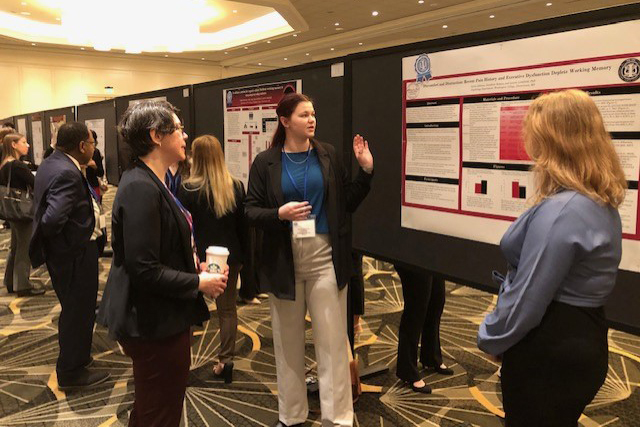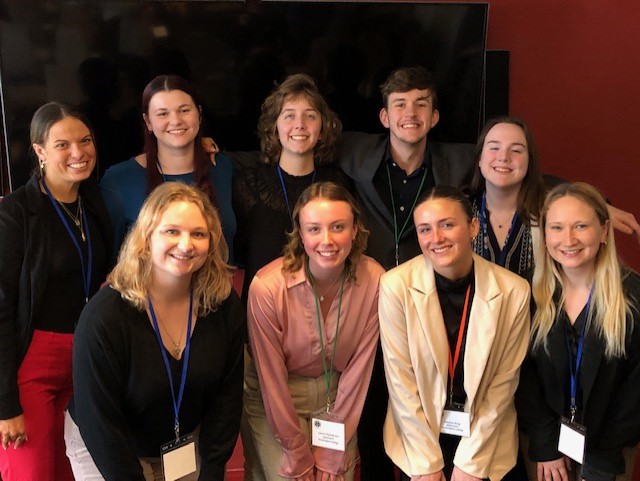Psychology Students Win Research Awards
Four Washington research projects representing work by 10 students won awards from Psi Chi, the psychology honors society, at the Eastern Psychological Association conference. Only 14 projects overall won the Psi Chi recognition in the northeast region.

Sylvia Johnson '24 (center) explains to a conference attendee the award-winning research
she and Josephine Robson '23 (Right) conducted. Posters on the other Psi Chi winning
projects from Washington College can be seen in the background.
The Washington College Department of Psychology every year takes some of its upper-level students to regional or national conferences to give them opportunities to present their research, network with professionals in their field, share information and advance their work. For Washington psychology students attending the 2023 Eastern Psychological Association (EPA) conference in Boston that also meant entering their presentations into a competition sponsored by the international honor society for psychology students, Psi Chi.
This year, four Washington research projects representing work by 10 students won Psi Chi awards, out of just 14 total awarded in the northeast region.
“It was a banner year,” in the words of Lauren Littlefield, Dr. Carol C. Culp Professor of Psychology, who advised the students on three of the four winning projects. Additionally, Washington College was recognized by Psi Chi as in the top 15 schools nationally and top three institutions in the eastern region with the highest number of Psi Chi Regional Research Awards received over the past 10 years, tying with St. John’s University.
 The students who worked on the winning projects were: Back Row Row (Left to Right)
Marah Vain-Callahan '23, Sylvia Johnson '24, Sarah Poirier '24, Jacob Lafferty '23,
Julia Totis '23; Front Row (Left to Right) Josephine Robson '23, Lauryn Konieczka
'23, Katelyn King '23, Andrea Petersen '23. Not shown is Reece Hrdlicka '24. Altogether, Littlefield and three other psychology professors took 21 Washington students
to the conference at the beginning of March, all of whom presented a poster on their
research projects, and the lead students on the four winning projects also gave a
two-minute talk on their work during a Psi Chi awards session.
The students who worked on the winning projects were: Back Row Row (Left to Right)
Marah Vain-Callahan '23, Sylvia Johnson '24, Sarah Poirier '24, Jacob Lafferty '23,
Julia Totis '23; Front Row (Left to Right) Josephine Robson '23, Lauryn Konieczka
'23, Katelyn King '23, Andrea Petersen '23. Not shown is Reece Hrdlicka '24. Altogether, Littlefield and three other psychology professors took 21 Washington students
to the conference at the beginning of March, all of whom presented a poster on their
research projects, and the lead students on the four winning projects also gave a
two-minute talk on their work during a Psi Chi awards session.
“We have a strong presence because of the generous donors who allow us to do this,” Littlefield said.
The Virginia M. Conner ’85 Fund helps to pay for registration, travel, lodging and food costs, which allows more students the opportunity to submit their research for the peer review process of having it considered for presentation at the conference. Many of the psychology majors who take their required research methods courses end up applying with the projects they have undertaken for those classes, while others submit work they completed as a research assistant in a faculty member’s lab.
This year, all four winning projects, representing the work of nine students total, came out of classes taught by Littlefield and Tia Murphy, chair of the Department of Psychology and associate professor.
One of the winning students, Sylvia Johnson ’24, researched the effects of pain and executive dysfunction (diagnoses such as ADHD, OCD, or similar challenges) on working memory, a topic she and her research partner, Josephine Robson ’23, arrived at through personal experience and interest. Johnson was impressed by how Littlefield’s mentorship facilitated their ability to reach significant results in their study, by helping them think through experimental design and connecting them to resources.
“I’ve heard so many people say there is something special about Washington College, and I think there is,” Johnson said. “I just feel really lucky to be at a place where those relationships are encouraged and fostered. You have so much support because these professors know you personally. It is not just a professional relationship. They want to support you as a person and help you succeed.”
Johnson and another Psi Chi winner, Andrea Petersen ’23, both said they enjoyed and found valuable the entire process of moving through Littlefield’s Human Neuropsychology research methods course, designing their own experiment, gaining Institutional Review Board approval, conducting the experiment, writing up the results, submitting and then presenting them at the EPA conference.
Both students said the projects confirmed their interest in research and the conference gave them a sense of what their professional lives could be like after graduating from Washington and moving on to either graduate school or research jobs. The added responsibility and opportunity to present their research at the Psi Chi session provided one more valuable experience to their time in Boston.
“It was very overwhelming getting that email,” Petersen said, sharing that at first it was exciting to learn she had won a research award and then the reality of presenting her work at the conference set in. “But preparing for it was a really good experience because if I want to go in to research, I will have to talk in front of people often.”
Murphy pointed out that the experience provides Washington students with an advantage as they plan their futures.
“It is so valuable for the students getting this experience to present. It really sets them apart when they are applying for graduate school or research positions,” she said. “They really feel prepared. It is giving them that experience and that leg up.”
Littlefield agreed, saying the research specifically, a focus of the psychology major at Washington, means students graduating from the College are competitive with students who have completed a master’s degree elsewhere when applying for graduate study.
“Our clinical/counseling students are learning to be practitioners, but they are also learning to be scientists,” Littlefield said. “All the tasks they had to do leading up to the conference and then at the conference are translatable both to graduate schools and careers.”
Psi Chi award-winning projects
Final author on each research project is the faculty adviser. All preceding names are Washington College students.
Discomfort And Distraction: Recent Pain History And Executive Dysfunction Deplete Working Memory Sylvia Johnson ’24, Josephine Robson ’23, Lauren Littlefield This study examined the interacting effects of athletic history, executive functioning, and pain on working memory. Previous studies have indicated that athletes have better pain tolerance, but that executive dysfunction and pain impair working memory. Forty participants completed a demographic survey and a working memory test while submerging one hand in ice water. Athletes endured the ice water longer. Participants with greater executive dysfunction or current pain experience had significantly lower working memory scores.
Does Caffeine Improve Cognition? Resilient Working Memory In Sleep-Deprived College Students Andrea Petersen ’23, Julia Totis ’23, Reece Hrdlicka ’24, Lauren Littlefield This study investigated the effect of sleep-deprivation on verbal working memory and the extent that caffeine plays a moderating role. Sleep-deprived and non-caffeinated college students were predicted to score lower on auditory-verbal tests. No significant results were yielded for the 2 (sleep condition) x 2 (caffeine condition) ANOVA on auditory comprehension or Number-Letter Sequencing scores. Therefore, students were resilient to short-term sleep deprivation, and a 100mg dose of caffeine did not facilitate performance.
Effect Of Mood On Memory In Immediate Visuospatial Recall Ability Sarah Poirier ’24, Marah Vain-Callahan ’23, Lauren Littlefield There is literature to suggest a relationship between emotion and cognition, but little
research is available on how emotional priming may impact visuospatial memory. Participants
were asked to recall and write about a happy, sad, or neutral event. Next, they were
given the Taylor Figure to copy and then draw immediately from memory, evaluating
visuospatial working memory. While the emotional priming method was effective, there
were no group differences. Ideas for future research are offered.
The Association Of Maternal Warmth With Children's Responses To A Mishap Lauryn Konieczka ’23, Jacob Lafferty ’23, Katelyn King ’23, Tia Murphy Previous research has found that higher maternal warmth is associated with greater levels of guilt in children. The present study observed maternal warmth and children's behaviors following a guilt-induced scenario. The results revealed that higher levels of maternal warmth were correlated with lower levels of reparation and greater unease after the simulation. Mothers with sensitive children (observed in the guilt task) might have displayed more warmth to help their children become comfortable in the environment.